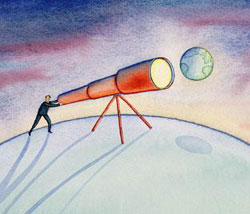 From afar, Nepal is looking good. That may shock and appall those of you queuing up to buy petrol, but it's true. The situation looks grim from Kathmandu but at a distance, one can see a rosy glow of hope, of dawn after a long night of discrimination and cynicism.
From afar, Nepal is looking good. That may shock and appall those of you queuing up to buy petrol, but it's true. The situation looks grim from Kathmandu but at a distance, one can see a rosy glow of hope, of dawn after a long night of discrimination and cynicism.
As I flew out of the erstwhile kingdom two weeks ago, the jaws of the capital's chattering classes were in overdrive. The tarai situation, Maoist nefariousness, secret king-led takeover conspiracies, an army coup, incompetence from the top down in the government, familiar scenes of a prime minister blithering while Lahan burned, the same old collection of high caste men plotting to deny everyone their rights.
Why, I was at one party where someone was so upset by it all, he barely managed a second whisky and had no appetite for the chicken momos. "It's, it's...just wrong." he sputtered.then grabbed a beaker of amber nectar and joined another conversation.
Nepal has always suffered from its elite's blinkered, close-up, stuck-in-the-moment vision. No distance, no history, no context, no hope. When you talk to the same people all the time, the conversation is bound to distill downwards. A spurious rumour you started last week is this week's absolute truth, next week's fallacious fact.
But as you move away from the crazed confines of the benighted Valley, time and space offer perspective. It all of a sudden seems almost comprehensible. What's going on around the country becomes logical and even a good thing.
What's not good is deaths, injuries, disrupted lives. So when I say that events in the tarai or elsewhere are to be welcomed, I exclude violence and its direct impact on people and families in the affected area. I do not however think there's anything wrong with a little discomfort and inconvenience in the capital. Too much comfort over the years has much to answer for here. That petrol line or the shivery dark moments during power cuts, think of them as opportunities to reflect upon what the Valley has, and the what rest of the country lacks.
That's what it is all about. People in the tarai are moving into the democratic space created by various Jana Andolans and demanding a share of it. They don't want empty promises or visions of equity and peace in some unspecific future. They want their space now, and they want lasting title to it. So does every other community in the country that has been left out while the top people of business, palace, and politics partied in Kathmandu.
Sitting in Canada, a diverse place that has had more than its share of aggrieved citizens, I feel Nepal's excluded masses are behaving logically. Just as the people of Quebec behaved here a generation ago. Basically they said "give us our share or we'll set up our own country". It's a tactic that worked beyond their wildest dreams. Quebec remains part of Canada but is both hugely autonomous and very influential in the country's federal system.
This is so obviously the way ahead for Nepal. The only way to meet the demands of all excluded groups is to move quickly towards a devolved, federal system of government, even in the interim before a new constitution. Give the people what they want, give it to them now. Share power and-crucially-share responsibility for governance.
Because you know what? That's exactly what's going to happen. Whether certain high caste men in Kathmandu like it or not. One way or another, federalism is coming, and soon. It's why Nepal is looking good. From a distance, anyway.



